Decommunization of the minds. Here’s how freedom and their own money teach communities to act rationally
The grandchildren and great-grandchildren of the people who survived collectivization, the Holodomor, dekulakization, repression, and war, now after the Revolution of Dignity gained the right to dispose of the collected taxes and to decide where to move next. And this right is encouraging: "Ukraine of a healthy person" is gradually sprouting in small communities. Here we are telling about the example of the Humentsi community in Khmelnytsky region.
Village head (starosta) Yuri Sikora taught at the university for 19 years, defended his PhD thessis, and then he got fired. Now he heads two villages. The people voted for him.
He carefully records the results of his work by collecting pink stickers in a transparent folder. "Don't laugh," he warns, showing it to me, and explains. “I write every appeal of people into a notebook and also on a separate sticker. I put the made stickers in a file, and then, when I report to people, I show how much I did.
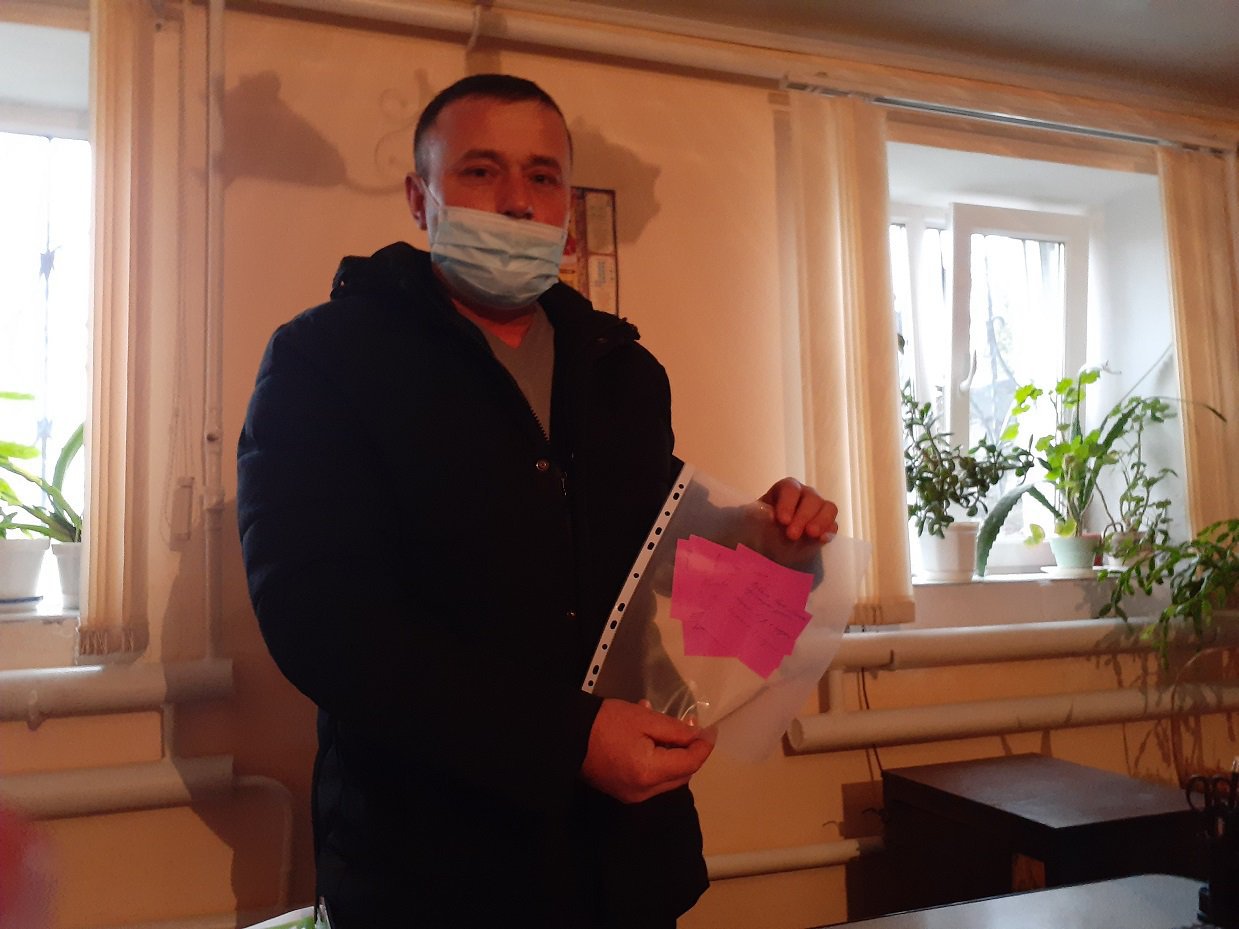
Yuri Sikora came up with his own form of reporting to the residents of his villages: all the stickers with the accomplished appeals are placed in a separate file
We are sitting in his office, located in the basement of a local kindergarten. The starosta says he is trying to live up to the expectations of the villagers, even those who criticize him. The village people's "opposition" is not silent. Yuri Sikora is closely following the posts in the local Facebook group "Holoskiv Times" and painfully takes accusations against him. Therefore, he tries to record every appeal and every fulfilled promise.
“The starosta is needed to solve questions on the spot, that's what I do”, he explains. “I grew up in this village and I know everyone. I communicate with people as a subordinate with the leader, because I am paid to help them”.
The starosta is paid 15 thousand hryvnias (according to the decision of the united territorial community representatives). Sikora considers his salary worthy. Every month, the village council commission on socio-economic development decides whether to charge the bonus to the starostas, 50% extra of the salary. This is another incentive to work honestly.
“We did the right thing by going our own way”
Humentsi united territorial community was one of the first to appear in Ukraine. Eight village councils that included 21 villages voluntarily merged in August 2015 with the center in Humentsi three months after the law on decentralization allowed for this. Other 16 villages joined gradually, after making sure that the neighbors benefited. The last two small villages (Tsykova and Karachkivtsi) were added before the local elections in 2020.
“At first, the villages did not want to join because they said that I was "bought", recalls the head of Humentsi UTC Inna Abdulkadyrova. “Apparently, they were afraid of change. Only now did it become clear to everyone that we did the right thing, that we did not join the neighboring city and went our own way. We received a lot of money, and we have already done a lot”.
She headed the united territorial community in 2016, although she has been working in this office for 23 years. Initially she was the village head. In the local elections last fall, 92% of voters voted for Abdulkadyrova. She says "she would be glad to leave, but people won't let her."
Inna Abdulkadyrova gives the impression of an authoritarian woman with a strong character, but it is difficult to suspect Humentsi UTC of a lack of democracy, and her head of authoritarianism, at least because all 14 village starostas whom she could simply appoint according to the law were actually elected by villagers voting.
“We made our own ballots and conducted surveys in the villages to find out who people want to see as starostas. The one who received the most votes was appointed by the head of the UTC, explains Vitaliy Svider, the deputy head of the Humentsi UTC. “After all, it is the starosta, not the head of the UTC, who communicates with the villagers every day. And people know better who is worth what and with whom it is better to deal”.
If there is a problem in the community and there are dissatisfied people, the chairman convenes a round table to which he invites all parties to the conflict and people who can help resolve the issue.
“This is called our working meetings”, says the deputy chairman of Humentsi UTC.
People were recruited for the newly created positions in the new rural UTC through open competitions. Almost all the newcomers came to the village council from Kamianets-Podilskyi city which is eight kilometers from the UTC center.
“There were no problems to get staffed: at least two persons applied for each position", explains Vitaly Svider. “For example, people with considerable work experience came to the Administrative Service Center.
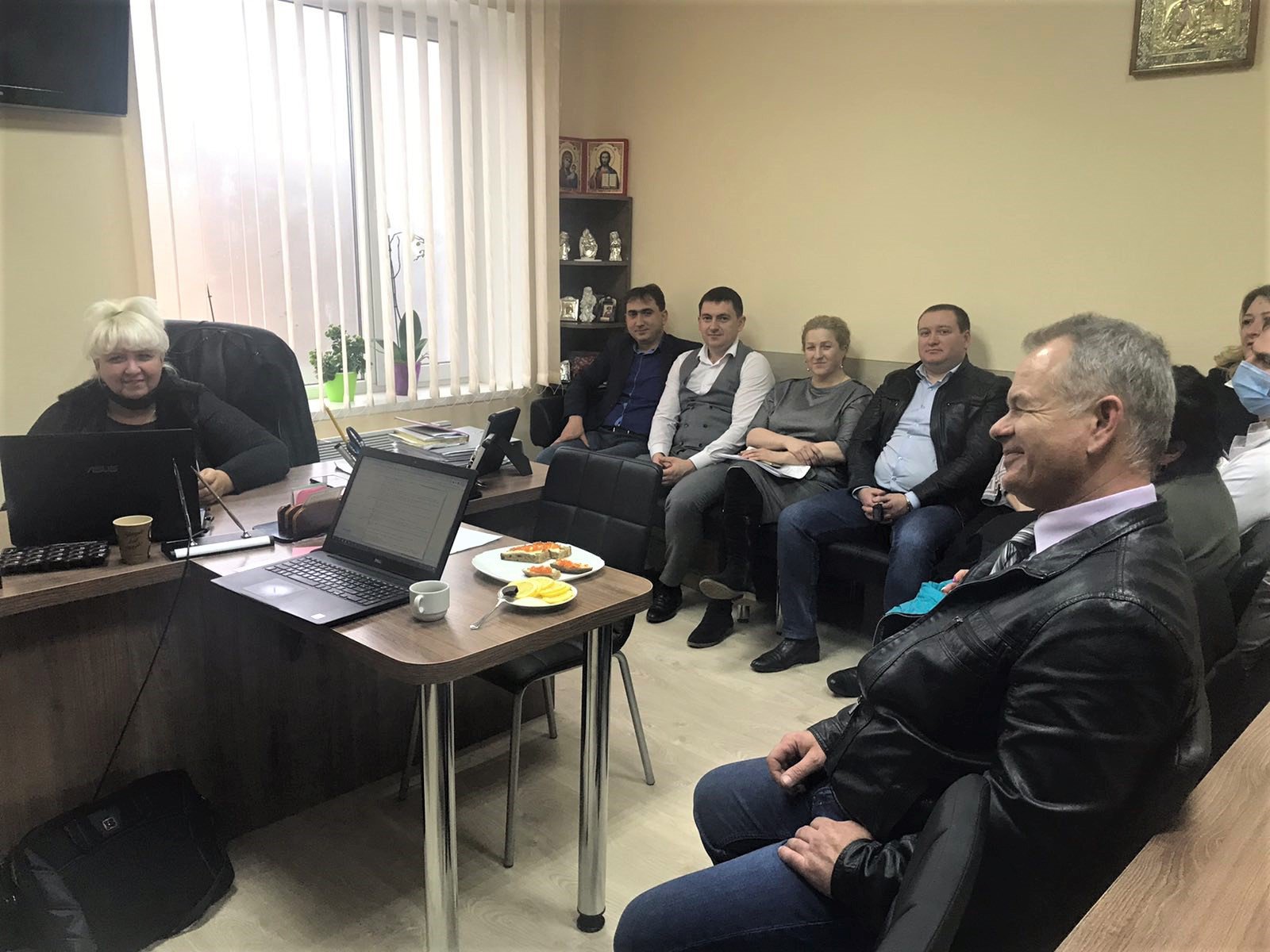
The head of Humentsi UTC Inna Abdulkadyrova gathered half of administration in her office: "We are able to reach agreements"
The Budget soared fivefold in a blink
The key to the welfare of the Humentsi united territorial community is 80 enterprises, thanks to which the annual budget of the UTC reaches 150 million hryvnias (only one-fifth of which is subventions from the state budget). This is a record for rural communities in Ukraine. So it is not surprising that Inna Abdulkadyrova hospitably treats me in her office with coffee and sandwiches with red caviar, in a rich way.
Thanks to the decentralization reform, the budget of Humentsi UTC increased fivefold in a blink of an eye. It was a real shock for everyone, because in addition to the money, the changes brought responsibility. Until 2014, following Soviet management practices, Kyiv determined where a lot of local money should be spent. But after the Revolution of Dignity, local councils gained the freedom to dispose of their own funds.
And even with such an experienced leadership as in Humentsi, one had to learn.
In that first year of financial freedom, a queue of people lined up for the office of the head of the UTC, asking for something to improve in their own village. Having collected these appeals together, local representatives decided where to spend money first of all.
“We invited specialists from the finance departments to the budget commission because former chief accountants from village councils work there, who, unlike us, have a huge experience of working with numbers. And that's why we managed to avoid outright nonsense”, the representatives of Humentsi UTC recall their first year after the creation of the community.
First of all, the residents of the UTC wanted to spend money on putting the common space in order. They started with the basics: in the first two years, street lighting was done in all villages and garbage collection was organized.
In the beginning, they wanted to spend the money on grand projects, and this is also part of the Soviet legacy: not to notice the pits on the sidewalks but talking about something global like the BAM. In Humentsi OTG, for example, people initially thought to spend 40 million to build a waste processing plant.
But after taking some knocks, having tasted independence, the villagers became more responsible. Democratic procedures and accountability are a wonderful school of rationality.
“Now we are much better able to set priorities: what to spend now, and what can wait. Enthusiasm has not gone anywhere, and I want to do more, more and more, but the mind says that everything should be done systematically, gradually”, Vitaly Svider shares his experience.
Benefiting the community with whatever one can
Humentsi began to receive income from local businesses long before decentralization began. Both small and large entrepreneurs, in addition to taxes, regularly donate funds for rural development. For this purpose, they conclude social agreements with the community every year. One who does not sign the agreement gives cash, buys, or does something for the village.
The amount of the contribution is discussed individually. Inna Abdulkadyrova is able to negotiate with the business. But the general approach is this: the more income, the more money for the needs of the community. Farms, for example, pay UAH 100 for each hectare of leased land, a small retail stall pays UAH 500 per year.
“We started signing such agreements a long time ago: when I was still the head of Humentsi village only”, she says. “Well, what did you think? It is necessary to live somehow. We have a school, a kindergarten, and a lot of problems. All taxes used to be sucked into the central government. And quarries and factories have never been poor. At their expense, we also kept afloat, even before the decentralization began.
Her deputy adds that entrepreneurs do not refuse to help, because they see where the money is spent:
“Here the starosta bought rubble for the road, the equipment for schools and kindergartens, and arranged a playground. And the business owner is proud of the fact that he invests money in the village, in fact, in the welfare of his or her own employees. They say, look: here, this is repaired, this is built”.
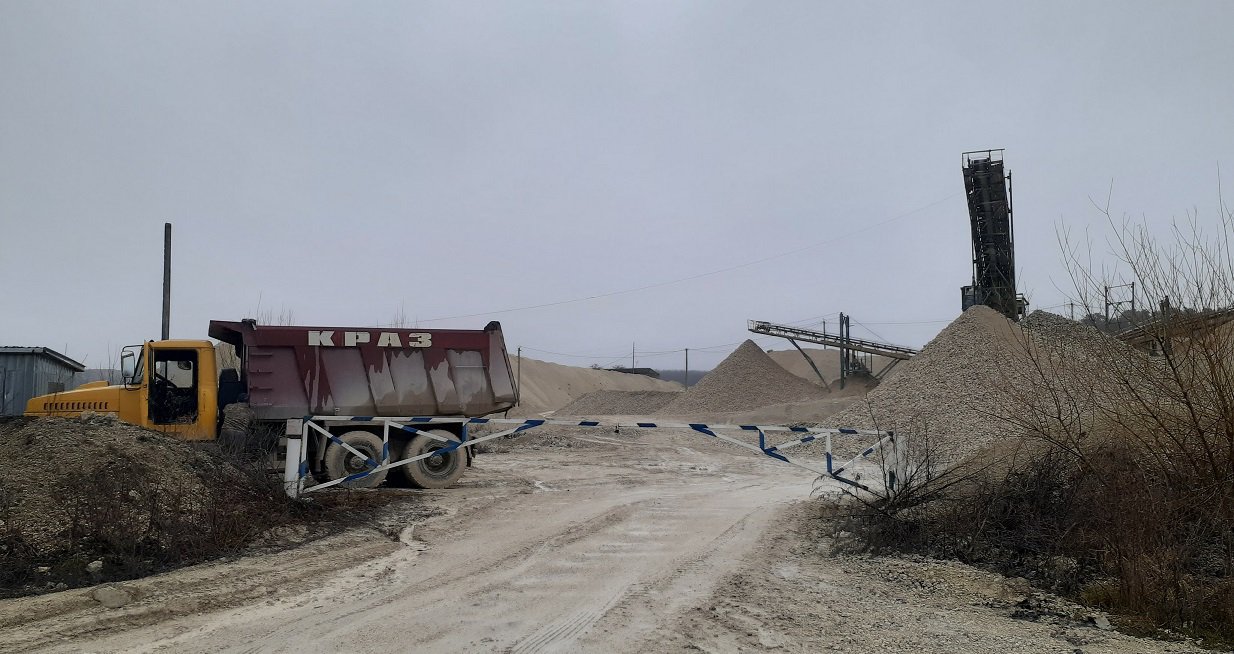
Quarries and factories provide the lion’s share of the community profits
For example, the agricultural company Nibulon leases 714 hectares of land in the village of Verbivka. Every year, in addition to the land tax, the village community receives an additional 714 by 100 equals 71,400 UAH for social projects.
However, the most noticeable change occurred when tax money poured into the community.
The UTC was actually surprised how much easier it became to implement projects without long-term agreements with the district and region.
“After the beginning of decentralization, two kindergartens were opened within a year”, the administration of Humentsi UTC explains. “The construction began under the rule of the District state administration, but as soon as we became independent, the long-term construction was completed very quickly. For example, windows and doors were replaced in Dumanivka school within just a few months: the program was accepted, financed, and implemented”.
The business sees how taxes work
Having seen how the native village turns into a cozy nest, small businessmen also became more actively involved.
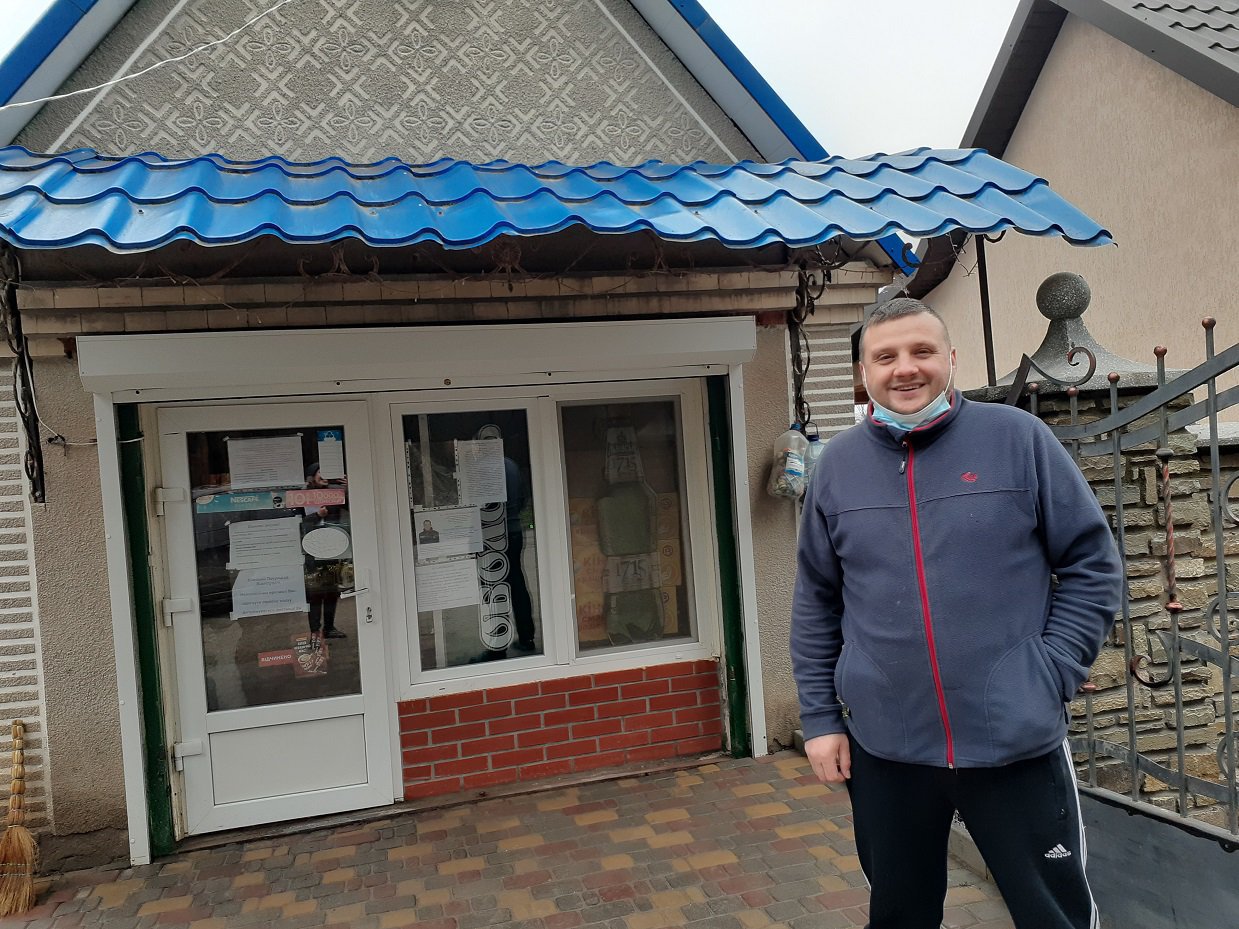
Dmytro Koval built a deli in his own yard. Although he has few customers, he helps the community with finances and a couple of hands
“How much money do I give? This is a trade secret”, says Dmytro Koval, a resident of Ulyanivka, standing behind the counter in his tiny deli, built in his own yard. “I buy what is needed, I do something on my own. Recently, I bought garbage bags when we were clearing the forest. One time I organized the guys to clean the pond near us, where people are fishing. Another time we shoveled rubble on the road. A year and a half ago the pit was knee-deep”.
The starosta of the village of Holoskiv Yuri Sikora remembers how local entrepreneurs united during heavy snowfalls:
“Equipment was provided free of charge, roads were cleared. The UTC also has its own equipment, but it will not be enough for 23 villages to do everything quickly.
The largest social projects are undertaken by the Podilsky Cement plant, one of the largest cement producers in Europe. Every year it replenishes the local budget by 35 million hryvnias. And now it is building a sports ground for 400 thousand, which can be used by local residents, including about half a thousand employees of the plant itself and their families”.
Local authorities respond to the business generosity with loyalty. New entrepreneurs are supported:
“Recently, we have more retail outlets, and these are jobs. Therefore, we also reduce the land tax for beginners so that they can strengthen and not close. We understand that it is always difficult to start”, the administration of Humentsi UTC explains.
Administrative Service Center with high returns
Valery Svider, who heads the local ASC, recalls that it was thanks to the initiative of the Humentsi community that a law appeared in Ukraine which made it possible to increase the income of all UTCs from the provision of administrative services.
“When we created the ASC”, he says, “we noticed that the money for the services rendered by us went to the regional budget. Well, how is that? Unfair! We were one of the first to raise this issue. The request was passed to member of parliament of Ukraine, Serhiy Melnyk (ex mayor of Khmelnytsky city), and he wrote the bill and it was voted for. And now we earn 300 thousand hryvnias annually, providing 146 types of administrative services. And if we were silent, we would "suck the paw."
One month ago, the ASC won a grant to purchase new equipment, so there will be even more services for local residents and funds in the local budget, 80% of which is spent on education, culture, and healthcare.
They just started a sports school
Initially, there appeared money in the local budget for free meals, two times per day, for students in grades 1-4 and children of people entitled to social benefits. Then, the school bus fare was abolished, also at the expense of the community.
But people wanted more. Then, on the basis of Humentsi Lyceum, a children's and youth sports school "Leader" was created, which costs the community 437 thousand hryvnias per year.
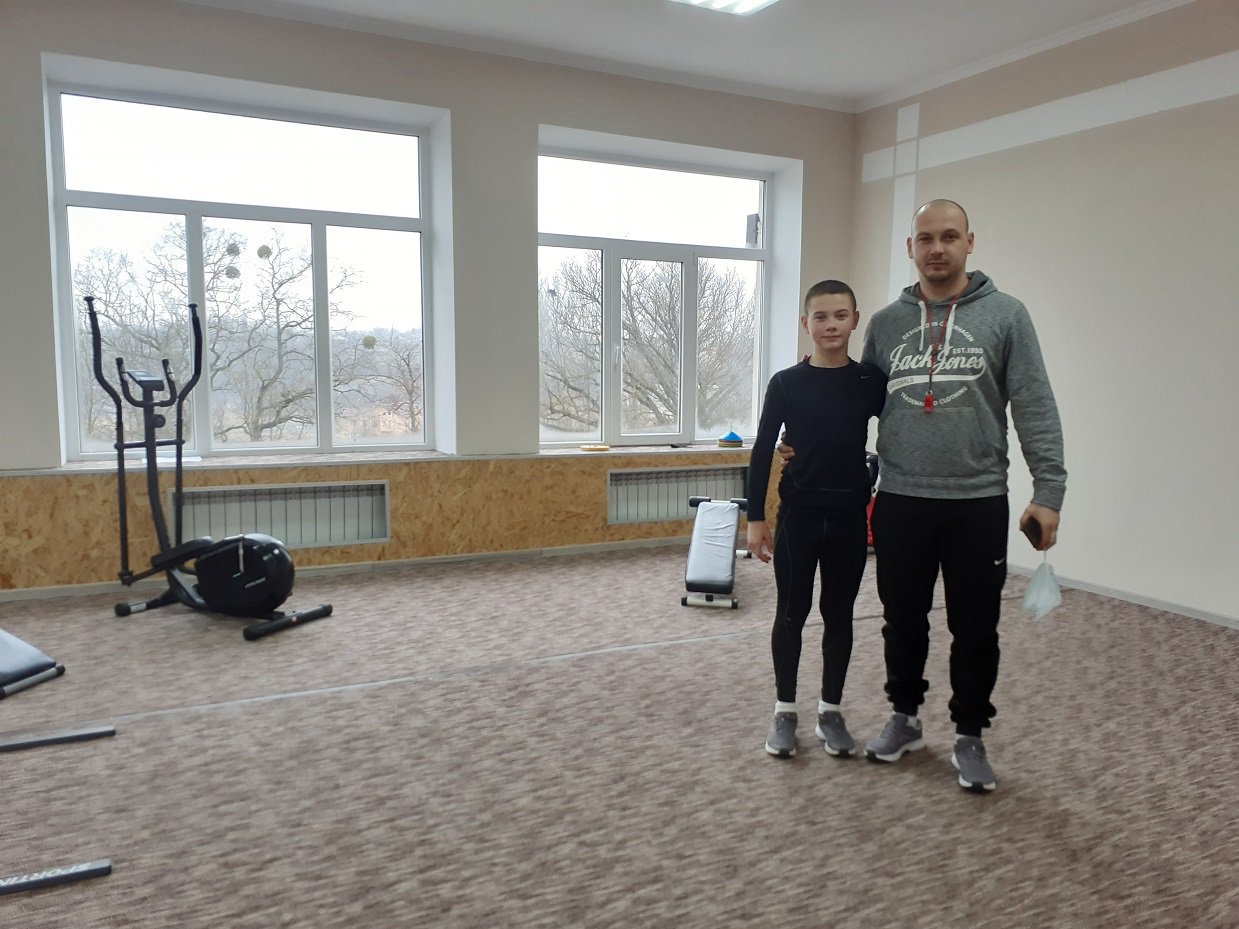
Student of the “Leader” sports school Andriy Shuminsky took second place at the Ukrainian Athletics Championships. Next to him is his brother and coach
See it themselves, show it to tourists
“We have something interesting in almost every village: Karmalyuk mountain landscape reserve, Nihinska Tovtra botanical reserve, a school in the ancient manor, a wooden church in the village Karachkivtsi”, says Lilia Sribnyak, head of education, culture, sports, and tourism of the Humentsi UTC.
She says that they have just started making signs to show tourist sites located near highways, undertook to restore historical monuments, and recently they organized a bike ride to the mines where a movie was filmed, and at the same time cleaned there. Now they are going to develop tourist routes.
Holoskiv Times broadcasting
To solve the community's problems, the villages began to actively communicate in social networks, and this gives real results. In Humentsi UTC, there are a number of groups on Facebook, where people join to clear the forest, clear the pond, then publish photos of the work done and enjoy the comments.
“The USSR thinking has died”, the local history teacher Serhiy Betlinsky states. “People have started to organize themselves to do something, they do not wait until they are instructed, and this is gratifying. Here is the Karmalyuk Mountain, there is the “Ukrainian Switzerland", a pine forest and an oak grove on the steep hills above the lake. They put benches and signs asking not to litter”.
“People are becoming more united, more and more often they come with their ideas and decisions, like, where to patch the road, where to fill the ditch, where to make a playground”, says the head of the UTC.
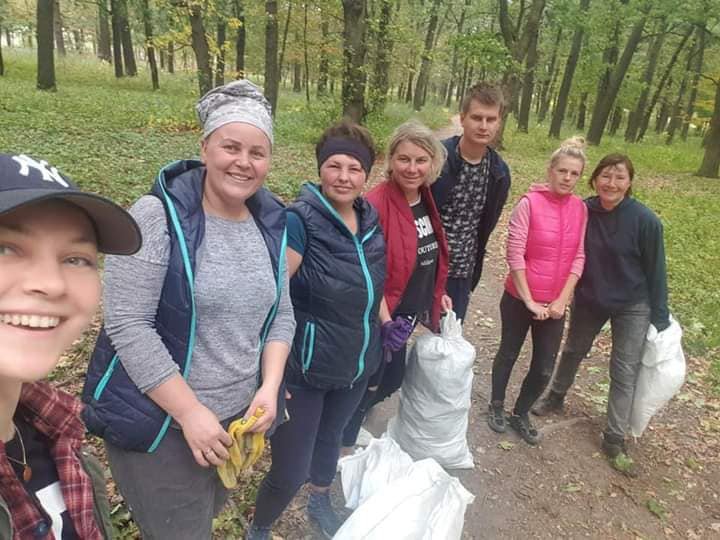
About half of the village of Holoskiv are registered in the Facebook group titled the Holoskiv Times. Photos from subbotniks are regularly posted here. This tradition appeared in 2016, and before that only students went out to clean
Six months ago, even in the small village of Ulyanivka, which rests on the forest at one end and in the fields at the other, its own Facebook group appeared.
“I love Ulyanivka: the forests here are beautiful, we are constantly walking the local trails, and at the same time cleaning there”, says one of the 333 residents of this village Diana Kachur, who works here as a paramedic and raises a three-year-old child. “We agreed among ourselves: everyone who lives near the forest ought to keep order near their places”.
A paramedic, in almost every village
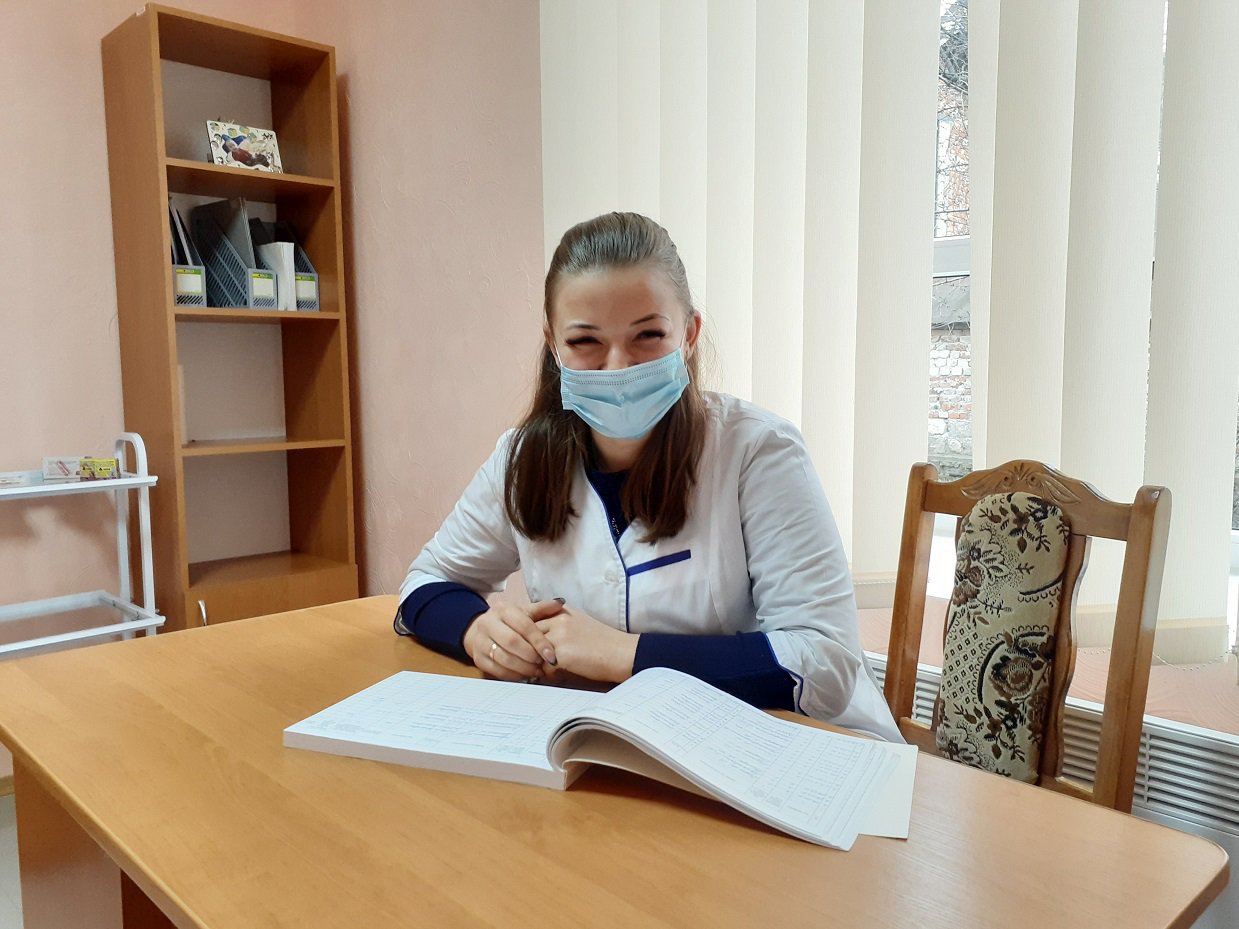
Diana Kachur, a paramedic, lives and works in a tiny village but does not plan to leave
Diana is 21, she graduated from a medical school in Kamianets-Podilskyi city and is not going to leave her native village. She feels needed here.
“Everything is here: work, school, kindergarten, Administrative Service Center, outpatient clinic, shop, sports ground, lake, forest, and even a beauty salon!” says the young woman and, after thinking for a moment, she adds: “And most importantly, I know everyone. And here is my home”.
The first-aid post was opened last year in a renovated room, fully equipped for emergency care. Every week she treats ten patients, who affectionately call her Dianochka.
“We have been asking for this for a long time, because we have a lot of elderly pensioners, and we want to have a doctor by our side. The head of the UTC agreed with us”, says a resident of Ulyanivka. “When I returned home after the operation, Dianochka bandaged me. And for medicine, I went to the neighboring village of Holoskiv”.
Dmytro with the symbolic surname Zdorovetsky (“Health-man”) is the director of the Center for Primary Health Care of the Humentsi village council. He signed an agreement with the National Health Insurance Fund at the end of 2017.
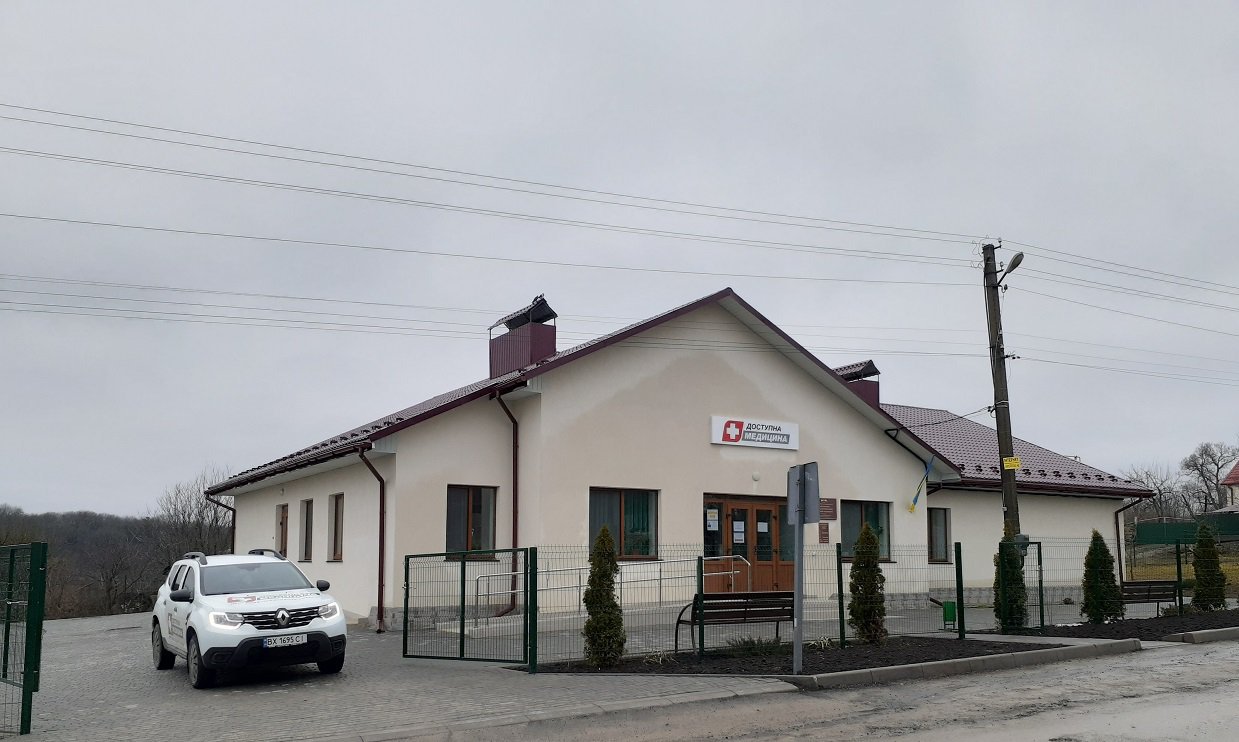
The construction of this outpatient clinic in the village of Holoskiv cost 5 million 603 thousand hryvnias and was co-financed by the state and local budgets
Two thirds of Humentsi UTC residents have already signed declarations with their family doctors. There are doctors to choose from: the community has set up four outpatient clinics and 14 first-aid stations on its own initiative. It finances them. And now, medical care is provided in 18 out of the 23 villages of the UTC, the residents of only five need to go to neighboring villages.
From 8 a.m. to 2:30 p.m., a paramedic works even in the village of Malozalissia with a population of only 135 people.
“We made repairs in all rooms, we bought furniture. About 700 thousand hryvnias were spent on this. We have 100% of what the Ministry of Health requires. We pay salaries to doctors ourselves. National Healthcare only bought us laptops and printers and brought the Internet to the premises”, says Dmytro Zdorovetsky. “And our doctors work not five, but six days a week: 6.5 hours on weekdays and 6 hours on Saturdays. So everyone is more comfortable”.
As medical services became closer, patients started self-medicating less and began to see doctors more often. Zdorovetsky reports that last year residents of Humentsi UTC received 7,000 prescriptions for free medicines under the state program "Affordable Medicines." And these free drugs are actually available in local pharmacies that have opened in several villages.
In case of any issues, call the “sheriff”
Even the police in the Humentsi community are "different." Locals are not used to calling 102, because they know the mobile numbers of the three police officers of the Humentsi community who guard the order exclusively within the 23 villages of the UTC.
The National Police Community Officer project started in May 2019, with only one in seven UTCs having their own police officers.
Humentsi UTC was one of the first to join this project. A police station, office equipment, and premises were set up, and the National Police bought cars and conducted training paid for by international donors.
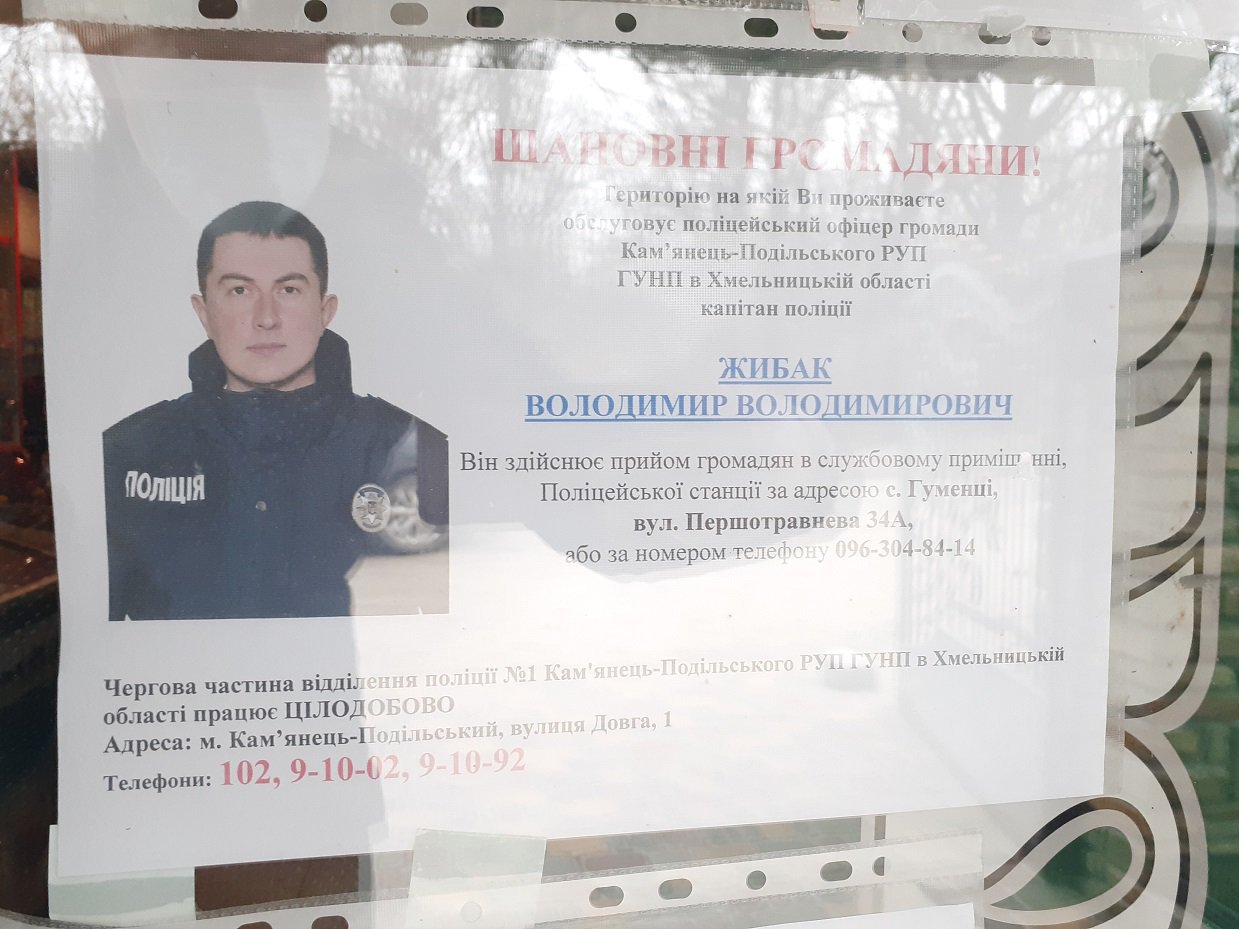
Three policemen are providing for the order in Humentsi UTC. Captain Volodymyr Zhybak is one of them
Vitaliy Melnychuk, Volodymyr Zhybak, and Oksana Kozlovska previously worked in the regional department in Kamianets-Podilskyi. Later they went to work in the UTC, winning over their competitors in the competition (four people per post).
“There were several stages of selection: tests for knowledge of the legal framework, an interview with a representative of the National Police, international experts and a psychologist; the third stage is a polygraph examination”, explains Oksana Kozlovska, who heads the “police and community interaction” department.
When asked about bribes, law enforcement officers joke:
“Our work is visible as on the palm of one’s hand. You do something wrong at least once, and everyone will know about it”, says Volodymyr Zhybak. “And we try to keep the authority”.
Villagers believe that it is easier to deal with "their own" police officers who are perceived as equal members of the community, rather than a "punitive body" from outside its borders.
“Now we spend all our working hours within the community, we don't go to meetings every day at 18:00 in Kamyanets-Podilsky, as before, we don't work in other areas'', the policeman Vitaly Melnychuk who works in Humentsi since 2009 tells. “We constantly patrol the villages in two cars, we have learned the local places well, we know people better, it has become easier to work: you can't go into a yard, sometimes, but you already know who lives there, what the family situation is like. And violations became less frequent: in 2020, from January 1 to March 12, there were seven crimes, and this year for the same period, only two”.
When asked about their attitude to the National Police reform, locals shrug their shoulders: “I don't know what kind of reform there is. We have normal police officers. We know them by name and patronymic. They work, they put in effort. We are not insulted."
Dilapidated roads are the main problem that has not been solved
The heyday of the past five years is probably the best time in the history of the ancient village of Humentsi, at least for the last 100 years for sure. The tragic history of the community is also remembered: each of the local libraries has a collection of books about the Holodomor and Stalin's repressions, collected and recorded testimonies of fellow villagers who witnessed those events.
But the names of the central streets in the villages are reminiscent of the Soviet past: Pershotravneva (May First) in one village, Chapayev in another. Nobody is going to rename them. The UTC leaders, in the spirit of many opponents of decommunization, say “why change the past, it is better to deal with the future”. This violation of the law and the names will have to be changed.
I would like to write at the end that the population in the Humentsi community is growing, in contrast to other villages. But this is not the case. Every year, a community with a population of about 15.5 thousand people loses 200 to 300 inhabitants. People die, and the birth rate, as throughout Ukraine, is low. The rate of losses, as compared to other surrounding villages, is lower.
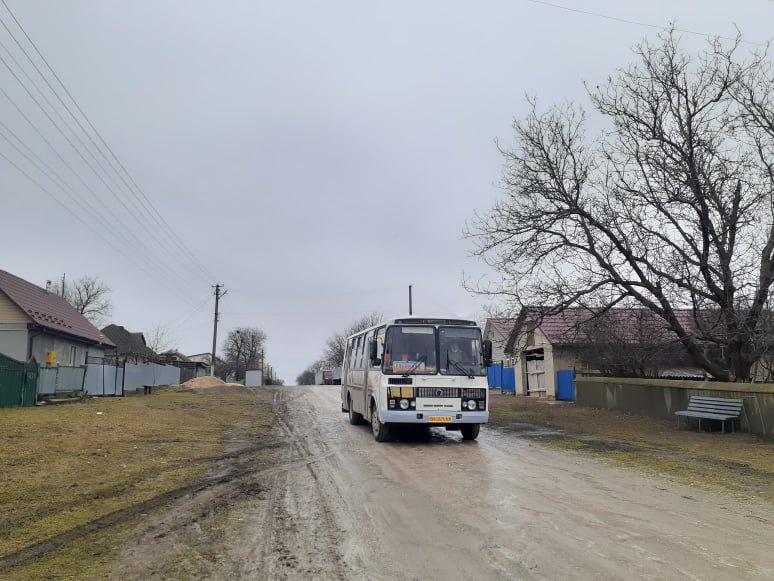
The only problem which the community can't solve on its own is terrible roads. There’s really not enough money for that
However, all the community residents in one voice tell that their main problem is not the low birth rate, but completely dilapidated roads. Despite a large budget, the UTC does not have the funds to repair dozens of kilometers of roads connecting the 23 villages. Pits on the roads spoil the mood of locals so much that sometimes they forget about other achievements of decentralization:
“We are a wealthy community, but looking at these puddles to the knee on the main street, I do not see this wealth”.
However, a journey of a thousand miles begins with a single step. In this community, the first step is long since completed.
All photos are by the author

